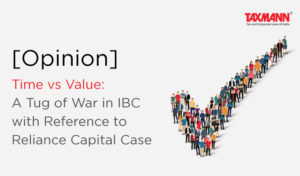[Opinion] Time vs Value: A Tug of War in IBC with Reference to Reliance Capital Case
- Blog|News|Insolvency and Bankruptcy Code|
- 2 Min Read
- By Taxmann
- |
- Last Updated on 2 March, 2023

‘Time’ and ‘Value’ are two ends of the same spectrum. Prudentially, a particular sum of money is considered to be more valuable now, than the same sum at a future point in time. This forms the conceptual base of the “Time value of money” and the underlying logic is the earning potential in the interim. Ignorance of the time value of money was a worrisome problem in the erstwhile Indian recovery laws. Revolutionarily, the Insolvency & Bankruptcy Code, 2016 (IBC) was created with the core objectives of “time-bound resolution” and “value maximization”, inter alia, in its long title. Nevertheless, there has been a constant tussle between these two objectives. This article analyzes the tussle by relating to the identically ongoing issue in Reliance Capital’s resolution process. Thereafter, the article delves into likewise precedents emphasizing and elaborating on the dual objectives. Ultimately, the authors propose to create a decisive guide for such a dilemma in the form of a Code of Conduct for the Committee of Creditors (CoC).
The Curious Case of Reliance Capital
Reliance Capital, a Financial Service Provider, was admitted into Corporate Insolvency Resolution Process (CIRP), after an application for the same by the Reserve Bank of India. By the instance of four rounds of challenge mechanism and as on the date of the last day of auction (i.e., December 21, 2022), Torrent Investments submitted the highest bid of Rs. 8,640 crores, followed by Hinduja Group’s offer of Rs.8,150 Crore. Pertinently, the liquidation value of Reliance Capital stood at Rs.12,500 crore as valued by Duff & Phelps and Rs.13,200 crore as valued by RBSA.
Hinduja submitted a revised offer of Rs. 9,500 Crore, including a Rs.8,800 Crore cash component. However, this revised offer was received a day after the conclusion of the auction. This revised offer of Hinduja left a chaotic confusion. Reportedly, on January 10, 2023, the committee of creditors took a decision to conduct another round of auction. Against this decision of the creditors, Torrent moved before the National Company Law Tribunal, Mumbai. The NCLT ruled in favour of the Torrent and remarked that the resolution process cannot be extended indefinitely under the pretext of “value maximization” and termed it as an “illegal mechanism” to circumvent the rules of India’s bankruptcy code. Aggrieved by the NCLT’s order, Hinduja appealed to the National Company Law Tribunal. The hearing in the appeal proceedings has concluded and is awaiting final orders.
The reason behind the fierce competition to acquire Reliance Capital is the possibility of effortlessly venturing into business domains such as the insurance and financial services market without the hassle of getting new licenses, regulatory permits and other industrial permissions. The chain of events, in the creditors’ eyes, is justified for the bidding value was drastically lower than that of the liquidation value. In the resolution applicant’s eyes, it boils down to the arbitrary exercise of commercial wisdom of the committee of creditors. By and large, this fight exposes the constant tussle between ‘value maximization’ and ‘time-bound process’ under IBC.
Click Here To Read The Full Article
Disclaimer: The content/information published on the website is only for general information of the user and shall not be construed as legal advice. While the Taxmann has exercised reasonable efforts to ensure the veracity of information/content published, Taxmann shall be under no liability in any manner whatsoever for incorrect information, if any.

Taxmann Publications has a dedicated in-house Research & Editorial Team. This team consists of a team of Chartered Accountants, Company Secretaries, and Lawyers. This team works under the guidance and supervision of editor-in-chief Mr Rakesh Bhargava.
The Research and Editorial Team is responsible for developing reliable and accurate content for the readers. The team follows the six-sigma approach to achieve the benchmark of zero error in its publications and research platforms. The team ensures that the following publication guidelines are thoroughly followed while developing the content:
- The statutory material is obtained only from the authorized and reliable sources
- All the latest developments in the judicial and legislative fields are covered
- Prepare the analytical write-ups on current, controversial, and important issues to help the readers to understand the concept and its implications
- Every content published by Taxmann is complete, accurate and lucid
- All evidence-based statements are supported with proper reference to Section, Circular No., Notification No. or citations
- The golden rules of grammar, style and consistency are thoroughly followed
- Font and size that’s easy to read and remain consistent across all imprint and digital publications are applied



 CA | CS | CMA
CA | CS | CMA
